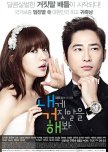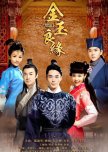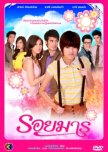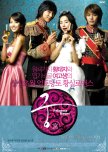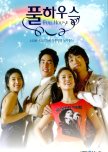
Both dramas center the three long-term female friends and the plots are simple yet show a slice of life in a comedic relatable way. Both are the kind of dramas which we can cry and laugh and feel relatable at the same time. And Im jin joo and Yoon Ji Ho give off the same vibe, both are the scriptwriter and brave yet weird in some ways.

A house-poor man and homeless woman become housemates in a drama that examines the institution of marriage and the problems that young people face today.
Nam Se Hui is a single man in his late 30s. He has chosen not to marry. He owns his home, but he owes a lot on his mortgage. Meanwhile, Yun Ji Ho is a single woman in her early 30s. She does not own a home and envies those that do. She has given up on dating due to her financial struggles. Yun Ji Ho begins to live at Nam Se Hui’s house. They become housemates.
Nam Se Hui is a single man in his late 30s. He has chosen not to marry. He owns his home, but he owes a lot on his mortgage. Meanwhile, Yun Ji Ho is a single woman in her early 30s. She does not own a home and envies those that do. She has given up on dating due to her financial struggles. Yun Ji Ho begins to live at Nam Se Hui’s house. They become housemates.

Yuki Rio, the daughter of an old, prestigious family in Kyoto with over 1,000 years of history, enters into an arranged marriage at the age of 16 with a man she’s never met. Her husband is Takamine Masatomo, a handsome CEO in the IT industry. Every year on her birthday, she would receive 50 million yen, making their relationship one based solely on money. One day, after ten years had passed with no contact, Rio decided to move to Tokyo. She asks her husband, whom she’s meeting for the first time, for a divorce. On the other hand, Takamine finds himself unexpectedly attracted to Rio and doesn’t want a divorce. Thus begins a romantic battle between a wife who wants a divorce and a husband who refuses to let her go.


Both dramas share the theme of finding home and hardships of house hunting that average people encounter.
Because This Is My First Life starts with main female lead trying to find a place to live and subsequently moving in with a housemate/contract husband.
Home Sweet Home depicts a story of an architect who is newly engaged and is trying to find suitable house of her dreams while not being rich.
Both stories have similar "real life" atmosphere and end up with life lesson.
Because This Is My First Life starts with main female lead trying to find a place to live and subsequently moving in with a housemate/contract husband.
Home Sweet Home depicts a story of an architect who is newly engaged and is trying to find suitable house of her dreams while not being rich.
Both stories have similar "real life" atmosphere and end up with life lesson.

- Both dramas depict lives of 30 year olds but portrays different struggles that equally resonates.
- Cohabitation
- Seemingly introverted / closed off ML
- Lovable side characters
- Filled with goofy, laugh out loud moments
- Both leads growing together
- and most importantly... FLUFFY PETS!!!
Thirty But Seventeen is currently the only drama I have ever felt that closely resembles Because This Is My First Life. There was even a instrumental cover of BTIMFL ost on one of the earlier episodes of Thirty But Seventeen that is absolutely delightful to hear :)
- Cohabitation
- Seemingly introverted / closed off ML
- Lovable side characters
- Filled with goofy, laugh out loud moments
- Both leads growing together
- and most importantly... FLUFFY PETS!!!
Thirty But Seventeen is currently the only drama I have ever felt that closely resembles Because This Is My First Life. There was even a instrumental cover of BTIMFL ost on one of the earlier episodes of Thirty But Seventeen that is absolutely delightful to hear :)
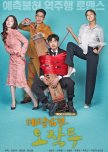
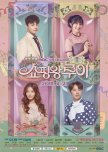
These dramas are both innocent cohabitation stories, and it's very focused on the main characters and their feelings, which was the best part in my opinion. I often dislike it when dramas try to cram so much into the story that they neglect to develop the main story, the reason why people watch in the first place. There's lots of cute moments in both stories, but they're realistic and not diabetes inducing or forced. I highly recommend them both, and if you liked one, I'm sure you'll like the other! :))

Even though Nam Se-hee Is not mentioned as an autistic person, he shares some characteristics that could indicate that he's in the spectrum. For example, he is very inflexible regarding routine changes, he likes order and cleanliness (it can't be said that these characteristics are specifically of those in the spectrum, but in this case it can be considered as such), among many other things.
The more you know Nam Se-hee, you start to realize that he's autistic.
_________________________________________________________
Aunque Nam Se-hee no se menciona como una persona autista, comparte algunas características que podrían indicar que está en el espectro. Por ejemplo, es una persona de mente cuadrada con relación a su rutina, le gusta el orden y la limpieza (no podemos decir que estás características sean especialmente del aspecto, pero en este caso podríamos considerarlo), entre muchas otras cosas.
Cuanto más conoces a Nam Se-hee, empiezas a darte cuenta que tiene mucho de autista.
The more you know Nam Se-hee, you start to realize that he's autistic.
_________________________________________________________
Aunque Nam Se-hee no se menciona como una persona autista, comparte algunas características que podrían indicar que está en el espectro. Por ejemplo, es una persona de mente cuadrada con relación a su rutina, le gusta el orden y la limpieza (no podemos decir que estás características sean especialmente del aspecto, pero en este caso podríamos considerarlo), entre muchas otras cosas.
Cuanto más conoces a Nam Se-hee, empiezas a darte cuenta que tiene mucho de autista.


Shirai Yui has decided to take a new job as a secretary at the law firm of her childhood friends, the Kami brothers. Yui has feelings for her older brother, Soichi, but when they meet again for the first time in 18 years, she is confused to find that Soichi has become a cool, unsmiling man. Meanwhile, her younger brother, Yushiro, has always loved Yui, but has not been able to express his feelings. And Soichi has been unable to express his love for Yui due to a childhood trauma. The love stories of Yui, who loves Soichi, Yushiro, who loves Yui, and Soichi, who is jealous of Yui's close friend, all intertwine.

Both shows revolve around a group of close friends who are in the workforce for a number of years. While BTIMFL has more romance, both dramas show workplace struggles and explores concerns about settling down.
There's also a quote from BTIMFL that always comes to my mind while watching ROTP: "Seoul is too cold."
There's also a quote from BTIMFL that always comes to my mind while watching ROTP: "Seoul is too cold."

Somehow they both give off a similar vibe. I feel that the humour (I laughed so hard in SWDBS and am finally finding something that makes me laugh just as much with BTIMFL) and the mix of lighthearted romance with pretty serious elements are kind of similar.
The storyline and the characters are totally different though. Although they are kind of the only progressive k-dramas out there: strong female leads and challenge of traditions.
The storyline and the characters are totally different though. Although they are kind of the only progressive k-dramas out there: strong female leads and challenge of traditions.

Xiang Yu Ping, a divorce and inheritance lawyer, is seen by others as cold, selfish, and ruthless. He had taken in his brother's orphans and was in need of a nanny. But after he exhausted his supply of nannies, he still couldn't find one who doesn't fall in love with him or gets scared off by the kids. Fed up, Yu Ping asks his secretary, Yang Duo, to find a nanny that meets his requirements. She recommends her younger sister, Yang Guo, for the job; assuring Yu Ping that her tomboyish sister will not fall in love with him by lying that she does not like men at all.











